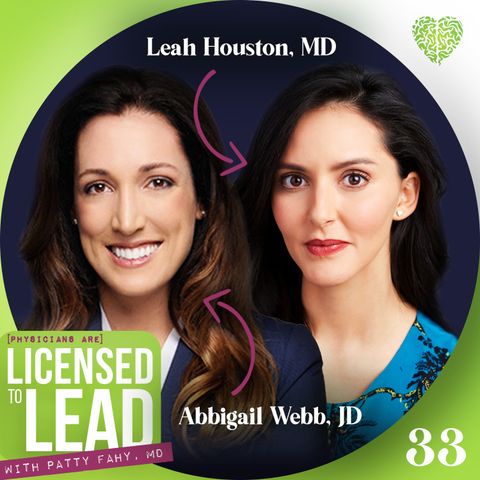033 - Physician Autonomy: A Legal Perspective and a Blockchain Solution

Scarica e ascolta ovunque
Scarica i tuoi episodi preferiti e goditi l'ascolto, ovunque tu sia! Iscriviti o accedi ora per ascoltare offline.
Descrizione
Leah Houston, MD is a serial entrepreneur, emergency medicine physician, and activist. She is the founder of: HPEC: Humanistic Physician Empowerment Community is a platform physicians can use to own...
mostra di piùEverCred: The system used by institutions to manage certification data and issue physician credentials that puts physicians in control of the primary source verification process.
Dr. Houston joins me on the podcast with Florida attorney Abbigail Webb. Ms. Webb raises an alarm about the loss of physician autonomy and points to the striking differences in professional autonomy between the medical profession and the legal profession. She raises questions about why non-physicians are in control of healthcare institutions and physician practices. She underscores how compromised physicians are in their ability to meet their fiduciary duty to patients because of the obvious conflicts of interest in healthcare systems run by non-physicians. In the U.S., only lawyers are allowed to own law firms—in marked contrast to ACA language (link to glossary below) that prohibits physicians from owning hospitals.
She draws additional comparisons between medicine and law:
•Legal oversight bodies such as State Bars and State Supreme Courts are made up of attorneys—unlike medicine where regulatory bodies have a variety of competing agendas creating oversight policies for the medical profession.
•Law firms are not publicly traded because lawyers are not allowed to be governed by or beholden to the interests of non-lawyer shareholders. Contrast that with the behemoth Fortune 50 healthcare systems driven by a profit motive, not medical professional values.
•Lawyers are not subject to non-compete clauses because it is deemed unethical to restrict clients’ ability to freely seek legal assistance from whomever they choose. The 70% of physicians who are employed are very often hamstrung in their career decision-making by non-compete clauses.
•The legal profession closely safeguards the practice of law, not allowing non-lawyers or paraprofessionals to hang out a legal shingle or use terms like lawyer, attorney, or Esq. Not so in medicine, where consumers and patients are unclear, sometimes misled, about who is a physician.
Ms. Webb believes quality of care for patients would be served by physician leadership of healthcare and she is an advocate for the digital solutions that Dr. Houston proposes.
What are those solutions?
Moving ownership of physician credentials to physicians themselves. This can be accomplished by storing credentials in an immutable, immediately accessible, blockchain wallet. A self-sovereign identity (SSI) means physicians themselves retain control and thus provide the primary source verification of their credentials and decide who has access and for how long. HPEC provides this capacity for physicians to have a wallet containing their credentials (and other digital assets). Dr. Houston’s other company, EverCred, provides a mechanism and platform for certifying bodies to issue credentials directly into decentralized identity wallet systems (like HPEC, but others as well—as long as they use rigorous established security standards). These systems are in development with pilot projects underway including a physician training program that is issuing credentials directly into HPEC.
The use of blockchain for establishing secure self-sovereign identities (SSI) for physicians opens the door to Dr. Houston’s bigger vision of physician autonomy and leadership. This includes: physicians creating their own referral networks; establishing patient records that belong to the patient (and not a healthcare system that uses patient data for their own profit-motivated purposes); and physicians establishing specialty-specific or other groups that advance physicians’ professional interests. She refers to the latter element as a “digital physician guild.”
Click the link for a glossary of blockchain and episode #33 terms. https://us19.campaign-archive.com/?u=933cc24c82771ef6017b37225&id=83d997e6e9
Meet the Guests
Leah Houston, MD
Dr. Houston is an emergency medicine physician and entrepreneur who has been a part of the blockchain and distributed ledger technology community since 2012. She is the founder of HPEC, building a platform to revolutionize the way physicians interact with health systems, insurance companies, and most importantly patients. HPEC gives practicing physicians ownership of their professional brand in a digital space through blockchain enabled self-sovereign digital credentials and identities. This will create employment mobility for physicians which will provide a mechanism for them to restore their autonomy and control over the sacred doctor patient relationship.
Dr. Houston is active on social media and is an internationally requested speaker and author on the topic of self-sovereign identity in healthcare.
https://twitter.com/LeahHoustonMD
https://twitter.com/HPECid
HPEC-Humanitarian Physicians Empowerment Community https://www.hpec.io/
Abbigail Webb, JD
Ms. Webb is a Florida Licensed attorney and General Counsel for a multistate automotive organization, with a background in litigation and business, consumer finance, and banking law. She has expertise in dispute resolution and enterprise risk reduction. She is an economic empowerment and financial literacy teacher, as well as a Bitcoin technology advocate.
https://www.floridabar.org/
SIGN UP FOR OUR NEWSLETTER: https://bit.ly/LicensedToLeadSignup
Informazioni
| Autore | Patty Fahy, MD |
| Organizzazione | Patty Fahy, MD |
| Sito | - |
| Tag |
Copyright 2024 - Spreaker Inc. an iHeartMedia Company
